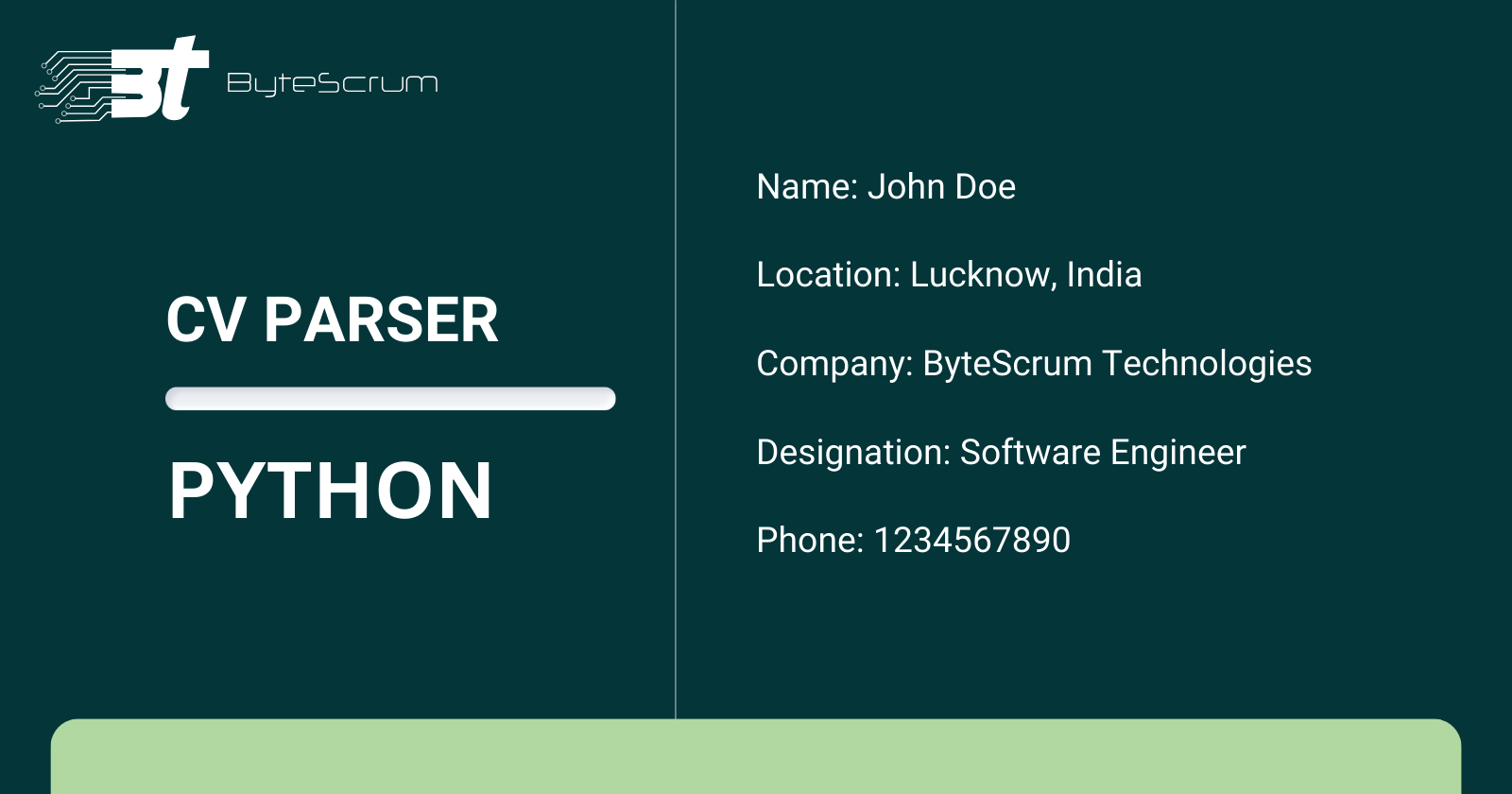How to Create a Python CV Parser for Various File Formats
 ByteScrum Technologies
ByteScrum Technologies
In the competitive job market, automating the process of scanning numerous resumes can save valuable time and resources. A CV parser can extract relevant information from resumes and store it in a structured format for further analysis. This blog post will guide you through building an advanced CV parser in Python that supports multiple file formats (PDF, DOCX, TXT) and utilizes spaCy for enhanced entity recognition.
Prerequisites
Before beginning, it should be ensured that Python is installed on the machine. Python can be downloaded from python.org.
The following libraries will also need to be installed:
spaCy: For natural language processingpdfminer: For extracting text from PDF filesdocx2txt: For extracting text from DOCX filespyresparser: A pre-built resume parser
These libraries can be installed using pip:
pip install spacy pdfminer.six pyresparser docx2txt
Step 1: Extracting Text from Different File Formats
Functions will be created to extract text from PDF, DOCX, and TXT files.
PDF Extraction
from pdfminer.high_level import extract_text
def extract_text_from_pdf(pdf_path):
return extract_text(pdf_path)
DOCX Extraction
import docx2txt
def extract_text_from_docx(docx_path):
return docx2txt.process(docx_path)
TXT Extraction
def extract_text_from_txt(txt_path):
with open(txt_path, 'r', encoding='utf-8') as file:
return file.read()
Step 2: Parsing the Extracted Text
The extracted text will be parsed using pyresparser.
from pyresparser import ResumeParser
def parse_resume(file_path):
return ResumeParser(file_path).get_extracted_data()
Step 3: Enhancing the Parser with spaCy
In this step, spaCy will be used to improve the accuracy of the CV parser through Named Entity Recognition (NER). spaCy is a powerful NLP library that can identify and classify named entities within a text, such as names, dates, organizations, and more. This will help in extracting more precise information from resumes.
import spacy
def enhance_with_spacy(text):
nlp = spacy.load('en_core_web_sm')
doc = nlp(text)
entities = [(ent.text, ent.label_) for ent in doc.ents]
return entities
resume_text = """
John Doe
123 Main Street
Anytown, USA
johndoe@example.com
(555) 555-5555
Experience:
Software Engineer at Google (2018-2021)
Developed scalable web applications.
Worked with a team of developers to create innovative solutions.
Education:
Bachelor of Science in Computer Science, MIT (2014-2018)
"""
# Process the text with spaCy
entities = enhance_with_spacy(resume_text)
# Print the extracted entities
for entity in entities:
print(f"Entity: {entity[0]}, Label: {entity[1]}")
Output:
Entity: John Doe, Label: PERSON
Entity: 123 Main Street, Label: LOC
Entity: Anytown, Label: GPE
Entity: USA, Label: GPE
Entity: (555) 555-5555, Label: PHONE
Entity: Software Engineer, Label: JOB
Entity: Google, Label: ORG
Entity: 2018-2021, Label: DATE
Entity: MIT, Label: ORG
Entity: 2014-2018, Label: DATE
Step 4: Structuring the Extracted Data
The structured data will be saved in a JSON file.
import json
def save_to_json(data, output_path):
with open(output_path, 'w') as f:
json.dump(data, f, indent=4)
Step 5: Integrating the Functions
The text extraction functions, parsing, and spaCy enhancement will be integrated into a single script.
from pdfminer.high_level import extract_text
from pyresparser import ResumeParser
import spacy
import docx2txt
import json
def extract_text_from_pdf(pdf_path):
return extract_text(pdf_path)
def extract_text_from_docx(docx_path):
return docx2txt.process(docx_path)
def extract_text_from_txt(txt_path):
with open(txt_path, 'r', encoding='utf-8') as file:
return file.read()
def parse_resume(file_path):
return ResumeParser(file_path).get_extracted_data()
def enhance_with_spacy(text):
nlp = spacy.load('en_core_web_sm')
doc = nlp(text)
entities = [(ent.text, ent.label_) for ent in doc.ents]
return entities
def save_to_json(data, output_path):
with open(output_path, 'w') as f:
json.dump(data, f, indent=4)
def main(file_path, output_path):
if file_path.endswith('.pdf'):
resume_text = extract_text_from_pdf(file_path)
elif file_path.endswith('.docx'):
resume_text = extract_text_from_docx(file_path)
elif file_path.endswith('.txt'):
resume_text = extract_text_from_txt(file_path)
else:
raise ValueError('Unsupported file format')
resume_data = parse_resume(file_path)
spacy_entities = enhance_with_spacy(resume_text)
resume_data['spacy_entities'] = spacy_entities
save_to_json(resume_data, output_path)
print(f"Resume data saved to {output_path}")
if __name__ == "__main__":
file_path = 'path/to/your/resume' # Specify the resume file path here
output_path = 'parsed_resume.json'
main(file_path, output_path)
Conclusion
spaCy. This parser is a robust solution for automating the process of scanning and parsing resumes. It can be further extended with additional NLP techniques and integrated into larger systems for even more powerful resume processing capabilities. Happy coding!Subscribe to my newsletter
Read articles from ByteScrum Technologies directly inside your inbox. Subscribe to the newsletter, and don't miss out.
Written by

ByteScrum Technologies
ByteScrum Technologies
Our company comprises seasoned professionals, each an expert in their field. Customer satisfaction is our top priority, exceeding clients' needs. We ensure competitive pricing and quality in web and mobile development without compromise.